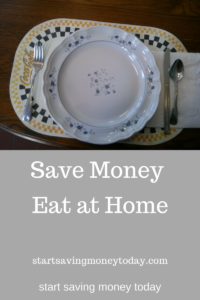Save Money Eat At Home
Talking points
- Eating at home is not necessarily cheaper than eating out
- Eating at home can be cheaper—if you shop correctly
- Shop correctly: make a plan, use a list, coupons, generic products
Occasionally, I go shopping with friends, and when I do, it seems to be a race. Who’s going to get done first? (I’ll tell you, now, it won’t be me.) They pass thru the meat section grabbing a hand full of steaks, a few pork chops, lunch meat, and a pound of bacon.
Next stop produce—not once consulting a shopping listshopping list, not once looking at the price. Here we go thru the deli. Thru the soft drink section: Just grab a case of Coke and keep going.
WOW! What a way to shop: never once looked at a shopping list, never once compared prices, and (of course) there were no coupons.
Save Money Eat At Home
At the checkout register I think, “They spend more on groceries in one week than I do all month.” I’m not sure they have spent less at the grocery store than they would have spent for a week of eating out—all three meals—everyday. Of course, that would depend on the restaurant. (Some places are less expensive to eat than others.) Here’s the point I’m trying to make: Every purchase should be evaluated. It’s not enough to say, “I can afford it. I’m happy with it.” And, hopefully, you do have a plan.
A person who is trying to get the most out of their paycheck needs to have a plan: Make a weekly meal plan: Make a shopping list: Take that list with you when you go to the store: Use it. You’ll be much less likely to buy items you don’t need—and you won’t miss something you do need. (This optimizes both your money and your time.)
Coupons are another way to save money. Couponing does take some time, so some people neglect to do it. (Now that there are apps that put them on our phones, it’s becoming somewhat more convenient.) Properly done—I’ll dedicate a future post to couponing—it can be very effective. I’m sure you’ve heard the saying “Time is money.”
For many items, I head for the generics and find the lowest no-brand-name variety of a product. Many times these are just as good as the so-called “top of the line” products. There are, however, a few generic items that are just not quite good enough for me: Say, toilet paper? When I need to buy these things, I look at the name brand versions, and use price comparing and coupons.
So, is it true—the premise that eating at home is cheaper than eating out? It can and should be, if you are a conscientious shopper. Don’t just grab groceries. Have a plan and some strategies that ensure getting every bargain you can. Use coupons, buy generic, compare prices. Are you actively trying to get the most for your dollar? Comparing prices is a great way to save.
Usually, the best way to do this is to compare the price per serving of several brands of a like item—like a name brand mac&cheese mix or instant hot
chocolate with the store brand. As you prepare your meal plan and shopping list, scan the grocery ads. Might as well take advantage of a sale price, but only if you are really going to use the item and can afford it. (Yeah—even on sale, price counts.)Personally, I prefer to shop alone or with my wife. You could include anyone who is highly involved in your “mutual funds” for food preparation. This way, there’s no social competition for time or status. You can make unbiased decisions about using those funds.
Your partner can encourage you to stick to your plan, or once in a (great) while agree to a delicious deviation from it.
Have you ever been told, “save money eat at save money eat at home“? It seems logical but it only works if you plan your spending ahead of time.


